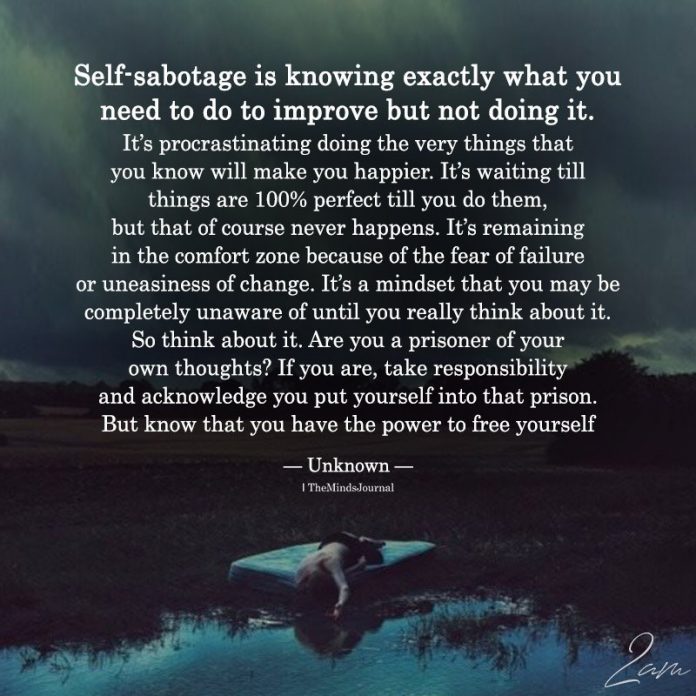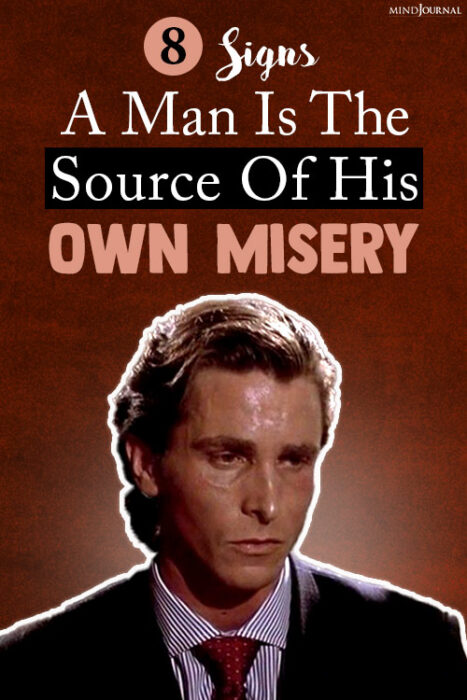Ever wonder why he’s always gloomy and unhappy? These 8 signs reveal how he might be the source of his own misery, with self-sabotaging behaviors being an obstacle his own path to happiness.
Self-sabotage is often the biggest obstacle to happiness.
Self-sabotaging behaviors, negative mindsets, and the absence of emotional intelligence can unknowingly pave the path to a cycle of unhappiness. While external circumstances influence our success and well-being, the biggest obstacles to happiness are often found within.

Some people cannot accept this responsibility, and these are the people who blame others and external factors for problems that are likely within their own control.
Read more here: 8 Mindset Shifts To Stop Repetitive Destructive Thoughts
Here are 8 painfully honest signs a man is the source of his own misery
1. He doesn’t take responsibility for his actions
The most attractive words a man can say are I did it, I could have done better, I am sorry. These expressions signify ownership of mistakes, acknowledgment of a mark that was missed and the person hearing them feels relief that a problem is on its way to being solved and a particular box has been checked.
But when a man blames external factors for his misfortunes, others for doing or not doing, and makes excuses and lengthy explanations he perpetuates a cycle of powerlessness.
Both his and yours. He is waiting for you to change and you are hoping he will be the change. Victim mindset, blame-shifting, and defensiveness all rob him of agency, and foster a sense of helplessness and confusion, trapping him in a perpetual state of unhappiness.
2. He doesn’t follow through on his promises
Regardless of his broad shoulders, disarming smile, and charm, when he has an excuse for lateness, or absence and repeatedly lets you down, you peg him as undependable and untrustworthy and move on to the person who follows through.
As you might imagine, this man is the source of shallow relationships that don’t get off the ground or end well, which creates a cycle of his and others’ unhappiness.
3. He has a negative mindset
You have heard that thoughts have a profound impact on emotions and behaviors, and the man who consistently harbors a negative mindset — dwelling on past failures, expecting the worst, and magnifying shortcomings — essentially poisons his well of happiness.
This pessimistic outlook distorts reality and maintains a cycle of self-defeat and unhappiness.
4. He surrounds himself with negative people
You can’t avoid adopting some of the traits and personalities of the people you spend the most time with.
Whether it’s toxic friends, pessimistic colleagues, or unsupportive family members he will become more like them over time and essentially bathe in their pool of negativity. These relationships drain energy and reinforce his negative patterns, further fueling his unhappiness.
5. He has no boundaries
Boundaries are essential for maintaining healthy relationships and safeguarding personality growth and well-being. However, a man who fails to set boundaries for himself allows others to trample over his emotional and physical limits, leading to his resentment and burnout.
His lack of boundaries also reflects the absence of self-respect. So, while he is desperate for the attention and care of others, he receives the opposite, contributing to unhappiness and dissatisfaction.
6. He disregards others’ boundaries
The man who doesn’t set boundaries is likely to be unaware or dismissive of the boundaries set by others.
He may push past someone’s comfort zone, ignore their need for space, or invalidate their feelings — essentially undermining trust and intimacy in relationships. This disregard damages relationships and perpetuates a cycle of conflict and unhappiness.
7. He lacks emotional intelligence
The man who doesn’t know and manage his emotions accurately or recognize emotions in others may laugh inappropriately or be unresponsive to another person’s suffering, either hijacking the tone of an event or showing a lack of empathy.
The result of this poor emotional communication is disconnection and alienation from the people he wants to be close to.
Without learning emotional intelligence, the man will continue the cycle of hurting others and himself. The deficit doesn’t end with lost relationships. The man who refuses to learn emotional intelligence will likely manage stress poorly, live in denial, and have trouble following through with his intentions.
8. He won’t try to heal
Men are famous for not seeking a therapist, reading self-help, or taking advice. They consider it a weakness to ask for help and blunder through problems. As a result, they dismiss their partner’s request for change and face reality only when the walkaway wife is through the door or he has created a lifetime of unhappiness for many. Often it is just too late.
Addressing these signs requires courage, self-awareness, and a willingness to confront uncomfortable truths. It involves taking ownership of one’s thoughts, behaviors, and relationships, and actively striving for personal growth and healing. While the journey towards happiness may be arduous, it is ultimately within our control.
By recognizing and addressing self-sabotaging patterns, men can break free from the confinement of their own making and embark on a path toward genuine fulfillment and contentment.
When a man is the cause of his own unhappiness, he tends to resist changes which may stop his personal-growth.
Want more relationship tips and life lessons? Join my newsletter Reclaim Your Day With Reta.
Read more here: 5 Ways You’re Sabotaging Your Life And Relationships
Did you relate to signs a man is the source of his own misery? Share your thoughts in the comments below!
Written by: Reta Faye Walker
Originally appeared on: Your Tango















Leave a Reply
You must be logged in to post a comment.